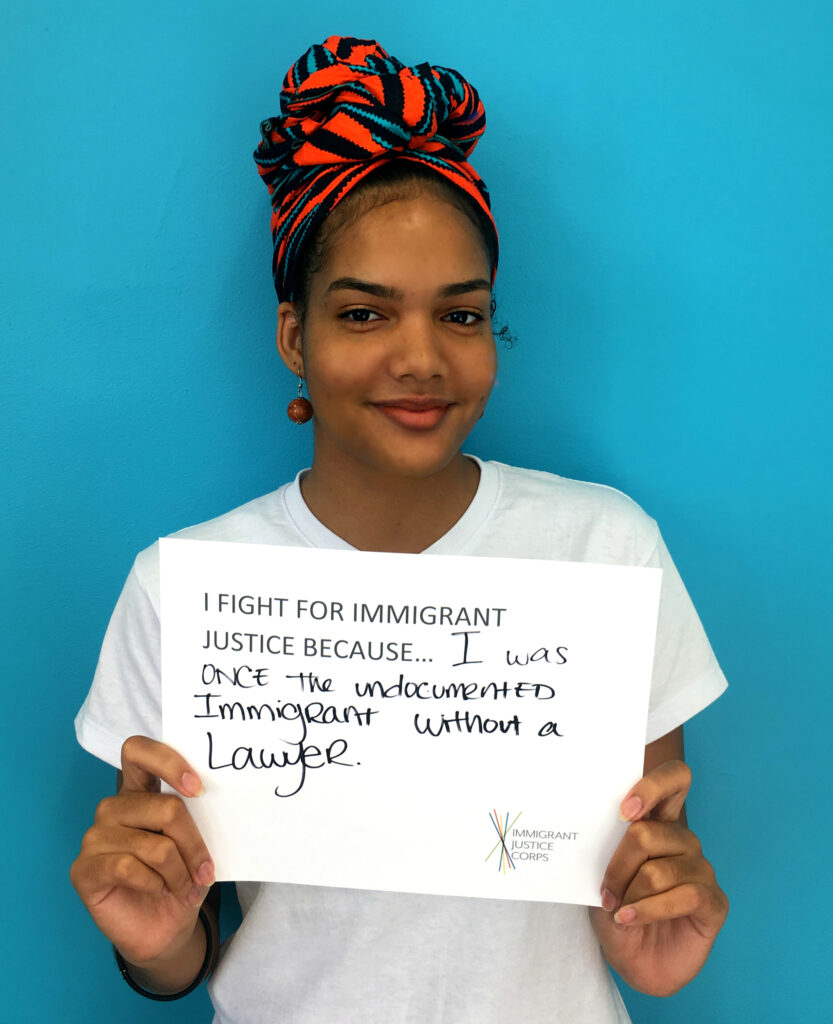Fellow Spotlight: Gissell Rodriguez
Gissell Rodriguez is a second-year Justice Fellow working at IJC’s Center for Immigrant Representation (CIR), a low bono practice that offers high quality legal services to immigrants at below market rates. The Center meets demand for representation in under-served communities in New Jersey. Below, Gissell reflects on a recent case win. Her client, who came to the United States as a child, was granted lawful permanent residence (a green card) after waiting in limbo for several years.
“I want to ask you kind of a weird question – am I free to marry and have children now?”
Even as I celebrated my client, Mr. G’s, green card win in early December, my heart broke. I became angry as I processed his question. Until recently, this was an all too familiar scenario for many unaccompanied children seeking safety in the United States. Mr. G was a Special Immigrant Juvenile (SIJ) recipient for more than three years before he was granted lawful permanent residence.
For a child to be eligible for SIJ status, the child must be under 21; unmarried; declared dependent on a family court; unable to reunify with their parents because of abuse, abandonment, neglect, or a similar basis under state law; and it must not be in the child’s best interest to return to their country of nationality. A SIJ recipient can apply for adjustment of status to lawful permanent residence if there is an immigrant visa immediately available for them.
Mr. G’s question stemmed from his previous lawyer’s advice to remain unmarried while petitioning to get SIJ status. Mr. G arrived alone in the United States from Honduras in 2014 when he was 15. He received SIJ status five years later due to abandonment and neglect by his father. Although Mr. G obtained SIJ status in 2019, he had to wait for three years before he could apply for a green card. He was therefore cautious about his life choices and their impact on his ability to adjust his status for a green card.
Children from Honduras, Guatemala, and El Salvador – also known as the Northern Triangle – must wait a long time after gaining SIJ to apply for a green card. The long wait is due to the limited number of immigrant visas available for SIJ recipients. Individuals like Mr. G are therefore forced to live in the shadows as they wait to adjust their status. Any significant life changes can jeopardize their chance to obtain legal status and remain in the United States.
Unlike other applicants for lawful permanent residence, SIJ recipients do not receive identification documents indicating their status. Depending on the child’s ability to get a passport from their country of origin, these children usually have no identifying documents, which makes them vulnerable. Some states like New York and New Jersey have tackled the ID issue by allowing undocumented individuals to apply for state IDs or driver’s licenses. But in states that don’t provide such documents, SIJ recipients risk being stopped by law enforcement officials with no identity documents on them. And until recently, SIJ recipients were ineligible for employment authorization.
A recent case in Missouri provided a new pathway for SIJ recipients to apply for a work permit, allowing them to legally earn a living while they wait to apply for a green card. However, work permits for SIJ recipients are discretionary and may not always be granted, which is terribly frustrating. For now, we wait and celebrate the victories we won, like Mr. G’s green card.
Mr. G now feels safe to apply to work wherever he wants. Before getting his green card, Mr. G was fearful for his safety. He knew he could be stopped and detained by Immigration and Customs enforcement (ICE) at any point. With a green card, Mr. G is excited at the prospect of exploring new places without the fear of detention. Mr. G is also happy to share that he is planning to marry, and the couple is expecting a child. With a green card, Mr. G can live a life outside the shadows.
***Update: In March 2022, US Citizenship and Immigration Services (USCIS) released a policy memo designating category (c)(14) as the proper SIJ Employment Authorization Document (EAD) filing category. The SIJ recipients able to apply for an EAD are those that have been granted deferred action upon implementation of the new policy effective May 6, 2022. More info available here.***
